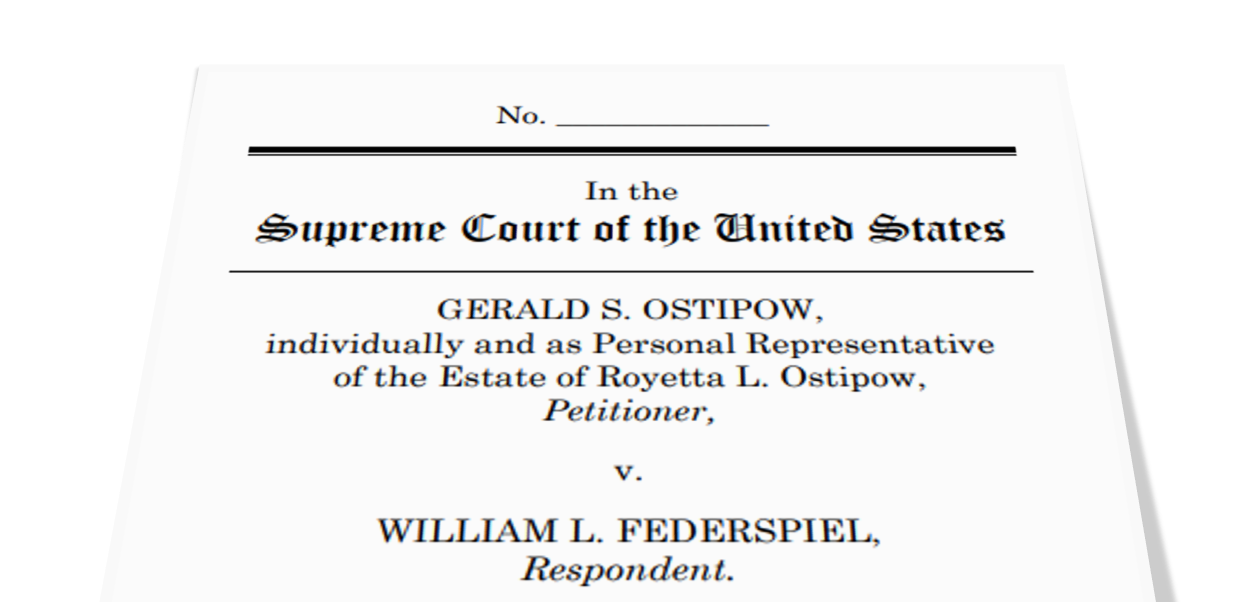OLC Files Appeal to the United States Supreme Court on Saginaw County's Civil Asset Forfeiture Practices
For Immediate Release | Apr 10, 2024
https://olcplc.com/public/media?1712759201

On behalf a Shiawassee County retiree, Outside Legal Counsel has filed a formal request with the nation's highest court to establish a prohibition against programmatic abuses undertaken in civil asset forfeitures by law enforcement agencies like Saginaw County and its Sheriff William Federspiel.
Download Petition
For the past fifteen years, Gerald Ostipow, a resident of Owosso, Michigan, has been forced to sue over and over to attempt to have the courts force the Saginaw County Sheriff to give him his property back or at least pay for what Saginaw County deputies had previously taken.
In 2008, sheriff deputies of Saginaw County raided Gerald's partial restored retirement home that he had been working on as self-restoration project. Only his son Steven lived at the property as a tenant. Unbeknownst to Gerald and wife, Steven had immature marijuana plants.
By use of a warrant issued by an out-of-county judge, deputies carted away Gerald's possessions gathered over a lifetime of hard work including family heirlooms, a nearly restored 1965 Chevrolet Nova, tools, home improvement equipment, and even deer mounts from past hunts.
After being tied up in court for eight years, a Saginaw judge found that many of the items taken had no connection whatsoever to any criminal activities falsely alleged against Gerald or his long-time (now deceased) wife. But by then, the Sheriff had sold the items (sometimes to his own deputies) and spent the money to pay for new department police equipment and general operations.
Civil forfeiture is a controversial legal process allowing law enforcement to seize, and then keep or sell, any property they merely allege is involved in a crime. Massive loopholes in state laws are exploited by local governments to generate extra funds to buy more equipment or pay for salary increases. Many associate "civil asset forfeiture" as being synonymous with theft.
At the heart of the disagreement is that civil forfeiture does not require the owner of the property to ever be convicted of a crime in order for assets to be transferred to the government. And if the government improperly seizes property, it is not required, under state law, to reimburse the innocent owner's losses or incurred attorney fees in fighting to get their property back. Civil forfeiture is seemingly a good idea when valuable ill-obtained property is taken from actual criminals, but what if property is accidentially (or intentionally by rogue police officers) seized from innocent owners?
Ostipow has sued twice in federal court and both times the local and regional federal courts sided with the Sheriff after representations were made to the courts that the government would pay the Ostipows for their unreturned personal assets if only more time were provided. But later, Sheriff Federspiel reneged.
In the Petition, Ostipow points out two other federal appeals courts in other parts of the country who have expressly rejected the Sheriff's repeatedly-made justifcations for keeping the seized private property of innocent owners.
At the US Supreme Court, Ostipow's counsel is asking the high court to adopt the rulings of those other federal circuit courts and reject the government-friendly outcomes provided by the Sixth Circuit (which hears appeals from Michigan, Ohio, Tennessee, and Kentucky). The Sixth Circuit has explained that while it "deeply sympathize[s] with the Ostipows," it believes cannot force the Sheriff to pay for what his agency originally took but refuses to return. Ostipow, his counsel, and even other federal judges elsewhere have disagreed with such an outcome.
"Our argument is simple," states attorney Philip L. Ellison of Outside Legal Counsel. "Once any criminal investigation is over, law enforcement cannot profit by simply keeping what they took from innocent owners. They must return all private property else pay for it."
This is not Outside Legal Counsel's first time seeking to establish key constitutional precedents before the highest state and federal courts. The United States Supreme Court recently ruled in favor of another OLC client,
Kevin Lindke, who had sued on First Amendment grounds when government officials deleted his critical comments from a city manager's Facebook page. The Michigan Supreme Court has previously
adopted OLC's ground-breaking argumentsthat the presumption of innocence and fundamental fairness precludes prosecutors and local courts from considering acquitted conduct when sentencing individual defendants that juries have found partially not-guilty. OLC attorney Philip L. Ellison has been a leading legal voice and appointed class counsel in various cases involving the illegal retention of equity following tax foreclosures.
###


